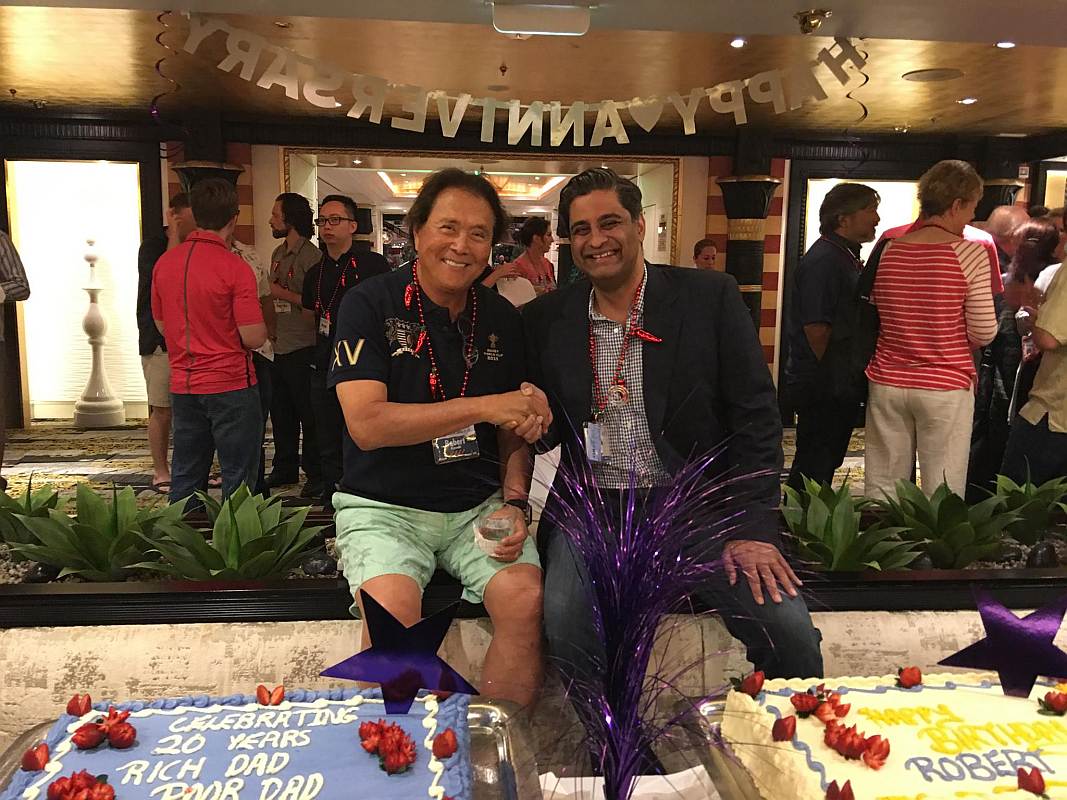087: Robert Kiyosaki on Why Educated Professionals Make Lousy Investors

Podcast: Download
You know, one of the interesting things about getting older is that you have the ability to look back and tell a story about yourself—to create a narrative about the moments and the people that, for better or for worse, changed the course of your life.
I remember the day I decided to become a doctor. I remember the day I met my wife. I remember walking into my beach house in Santa Barbara for the first time.
At the time, these moments don’t seem that significant but you realize how quickly, on a day to day basis, little things happen that end up making an enormous impact on the direction of your future.
For me, one of those moments came on the way back from my honeymoon in Puerto Vallarta. My wife and I got married the day after I graduated from residency in 2008 and left for a week in Mexico.
On the way back, I was looking for something to read on the plane. So I found a dingy bookstore that had a handful of books in it—mostly romance novels.
The only book that sounded remotely interesting was a purple book called the Cash Flow Quadrant.
I didn’t know anything about money at the time but I knew I was finally going to start making some after years as a broke surgical resident so I figured I’d try to learn something.
At that moment, I had no idea that making that decision to buy that book in a third world airport would forever change the course of my life.
I’m not exaggerating folks. My identity at that time was as an academic surgeon. I had made my mark by writing papers and book chapters.
The only financial education I had in my life was a macroeconomics class that I took in the last quarter of my senior year of college just to meet a requirement—and I took it pass-fail so I could do the bare minimum.
I had no interest in money and no interest in investing. Like many doctors, I thought of money as dirty and something that people with manners did not talk about.
And, I fundamentally did not understand what it meant to be an entrepreneur–much less consider whether or not I would like to be one myself.
I am not exaggerating when I say that reading that The Cash Flow Quadrant had no less affect on me than being struck by lightening.
After all, who am I now?
In order of how I view my identity:
1) I am an entrepreneur.
2) I am an investor.
3) I am a financial educator.
4) I am a husband and father to three little girls.
5) I am a Minnesota Vikings Fan.
6) I am a board certified surgeon who doesn’t practice anymore.
This is my stream of thought when I honestly ask myself who I am today.
I was 34 years old when I finished my surgical training—the culmination of my formal education.
Thousands upon thousands of hours of study and long hours in the hospital went in to create this identity of a surgeon…and now, it’s number six on my list!
And to be clear, the only thing I regret about this list is that I didn’t get to this point quicker.
We all grow up with talents—many of which we will never know. What if Wayne Gretzky grew up in Africa?
It is truly a gift to be able to find your true calling. Sometimes it just takes a little bit of luck.
For me, this moment of luck came when I stumbled upon the work of Robert Kiyosaki.
Having him on Wealth Formula Podcast this week, for me, represents a momentous milestone in my journey.
Please indulge me, and yourself, by listening to the show!
Show Notes:
[00:40] Introduction (wealthformula.com, ahpfunding.com)
[02:56] The art of aging
[03:38] Remember your life-defining moments
[04:28] The Cashflow Quadrant
[06:45] The “dirty money” misconception
[09:37] What if Wayne Gretzky was born in Africa
[11:57] Buck introduces Robert Kiyosaki
[12:38] How the education system is widening the gap between rich and poor
[17:07] Why the education system refuses to adapt to current climate
[21:34] The “smart people issue”
[23:46] How would Robert redesign the education system
[26:23] What is Robert’s drive in elevating financial well-being
[29:26] Hard asset is the future
[32:07] What does it mean to be really wealthy as a human-being
[34:00] The 4 types of education: academic, professional, financial, and Spiritual
[35:58] New Orlean investment conference
[39:08] Robert’s prediction of our near future
[42:28] Outro
Robert Kiyosaki’s books that were mentioned: Rich Dad Poor Dad, Why the Rich are Getting Richer, More Important Than Money: an Entrepreneur’s Team
 Send Buck a voice message!
Send Buck a voice message!



